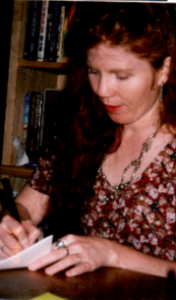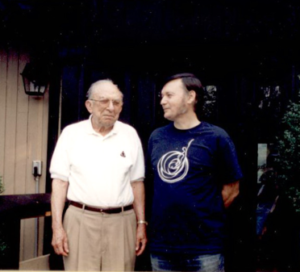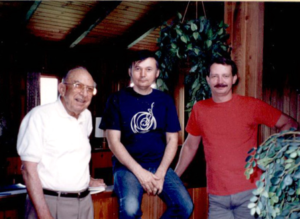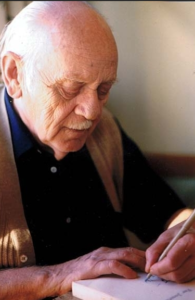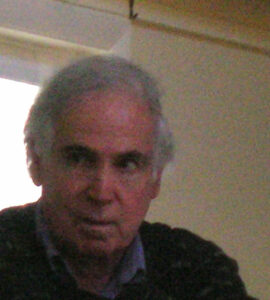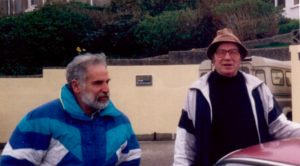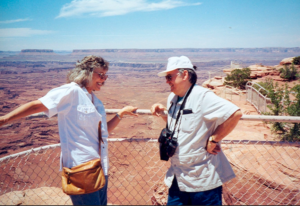
In the desert she loved so much
When you sit down to write about the people who have given your life decisive turns, sometimes it’s easy and sometimes it isn’t. Some people affect you by an action, or by being the right person at the right time; others, by who they are as example or as catalyst. In the former case, the linkage may be obvious; in the latter, not necessarily. I am finding that some of those who affected me most deeply, did so in ways I find hard to explain.
Dana, like my friend Louis who I mentioned in an earlier post, was one of those whose effect is hard to express to others. The things that can be said, don’t express it. The things that made the difference, can’t be said, and can hardly be pointed to.
But just because something is nearly incommunicable doesn’t mean it is unimportant. In fact, I would argue that it is often the reverse: The deepest influences make less of a splash at the surface. I’d make a small bet that this is equally true for everyone who ever reads this.
Dana stretched my boundaries in many ways. But I find it hard to write about . Unable to write about the profound things, I am unwilling to write about the superficial ones. And that’s too bad, because she was a very interesting person, a gifted author, a remarkably self-educated person, and superlatively funny both in person and in print.
When she sent us the manuscript of her first novel, Ezekiel’s Chariot, I loved it and insisted that we publish it. If I remember rightly, this was one of our first ten titles. Unfortunately, metaphysical fiction was a hard sell. Bookstores were making some money on what was called New Age or sometimes Body Mind Spirit books, but these were non-fiction. An author not yet known to the public would get lost among general fiction, but we found it next to impossible to persuade bookstore owners to leave a little room in their New Age section for fiction other than James Redfield or Richard Bach. Over the years, we worked to get the industry to accept a category named Visionary Fiction, but without much success.
Still, we published Dana’s other novels: Lucy Blue and the Daughters of Light, and Jonah. Here was visionary fiction as its best: insightful, deep, intricate, funny — God help us, could she write funny scenes! Metaphysical fiction often falls into preachiness. She did not. But we didn’t do a very good job of promoting her books, a fate that many of my authors were to experience over the years.
Dana’s deepest concern, though, was not the exercise of her considerable literary talent, but exploration of her experiences as one who repeatedly had been abducted by aliens. And this posed quite a problem for me.
Talk about cognitive dissonance! On the one hand, I never doubted that Dana was telling the truth. She didn’t lie, she didn’t exaggerate, she didn’t embellish or shade things. But that only made it harder to edit her books (Summoned and The ET-Human Link} because how was I supposed to edit a book I could scarcely wrap my head around? I had been reading about flying saucers since I was in high school, but this was another level of complexity. Most of the issues she raised were things I knew nothing about. Yet there was no one else to do the editing, and no other prospective publishers.
Perhaps you think this was no dilemma at all, that I should have either disbelieved her or accepted her interpretation of what had happened. I didn’t see it that way, and fortunately Dana was not at all invested in proving that she knew everything. (When I said that one of her abduction experience seemed to me to be a second-body experience, she did not take me to be disbelieving her experience; she was intrigued and wanted to know more, and we wound up having quite a discussion.).
As you probably know, being an experiencer puts you in a difficult position. First, it is often traumatic. Second, people don’t believe you/ Third, if with time you come to understand more of what’s going on, you may find the new understanding to be as overwhelming as the original experience.
Trauma. If you can be abducted at any time, from any place, and you have nothing to say about it, where is your sense of safety in the world?
Disbelief. If your family and friends – let alone stray acquaintances and strangers – either flat-out disbelieve you or at best give you a strained believe that has more to do with personal loyalty than with true belief, where do you go for support? It is one more form of being “in the closet,” however unwillingly, because, as Thoreau said long ago, it takes two to tell the truth: one to tell and one to listen. And what if nobody believes you? As Dana said once, someone steals your jewelry and when the police show up, all you have to show them is an empty box and a story.
.Overwhelm. The more she thought about what had happened, and compared notes with others when she finally found them, and read books and attended conferences, the more questions it raised. A one point (she being on very good terms with her guys upstairs), she was impelled to study quantum theory, for no reason she could have named. Later it turned out to help her understand some things about what was going on above and beyond so-called normal life.
In a very real sense, her quest for understanding was much like mine; in fact, there were close overlaps. And this was both reassuring (it’s always good, having company) and disconcerting (tending to uproot even the tentative understandings already achieved).
Dana died of lung cancer in 2007, after a long struggle. I have a box of correspondence from her, written in her quirky, not-too-legible script (not that I should talk),. When I pick up one of her letters, her personality comes back vividly.
Dana found it hard to live in this world, and I was relieved for her when she was finally released, but, as I said when my brother died, later that same year, death is not the end of everything, but it is the end of something. She was a pure soul and a great joy, and, as I say, most of what knowing her brought me is incommunicable.
Bon voyage, my friend.
